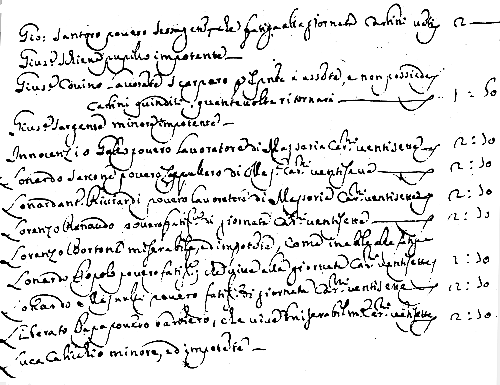List of fuochi from Ascoli 1728A frequent method of taxation is a levy on each household. To assess and collect such impositions, a list of households must be drawn up, usually giving the name of the eldest male as the 'head' or in absence of an adult male, the eldest female. The name 'hearth' tax was often given to these levies - in Italian fuochi, in French feux - but unlike the 17th century English Hearth Tax, these were not assessed on the number of actual fireplaces. In southern Italian communities during the early modern period, there were two main ways of raising local taxation, dazii - indirect taxes on food, wine, etc. - and fuochi. From the mid 18th century there was an attempt to move universally to the fuochi system which was seen as more equitable. Nevertheless, in towns like Ascoli, fuochi assessments were rarely more than a legal fiction. The fuoco of 1728 is a one-off response to a crisis in the local economy, while the better known Catasto Onciario of 1753 appears never to have been implemented. Usually there is a method of distinguishing a number of taxation bands so that poor people do not have to pay as much as the wealthy. This may be based on property, on income or on a combination of factors. The Ascoli example below gives brief information about each name. Most of the men listed have an occupation though some are described as impotente which implies inability to work for some reason (age, disability). Some descriptions mention property, and in the example one man is described as non possiede - not owning property. Most of the men in the example are described as povero - poor. Although this may be true, it must always be born in mind that this is a taxation document and pleading poverty may therefore have benefits. This list is in fact divided into groups on the basis of taxable status, so that the 'poor' and reduced rate taxpayers are placed together at the end of the document. The names are listed in order of first names, a common practice at the time.
Notes
|
